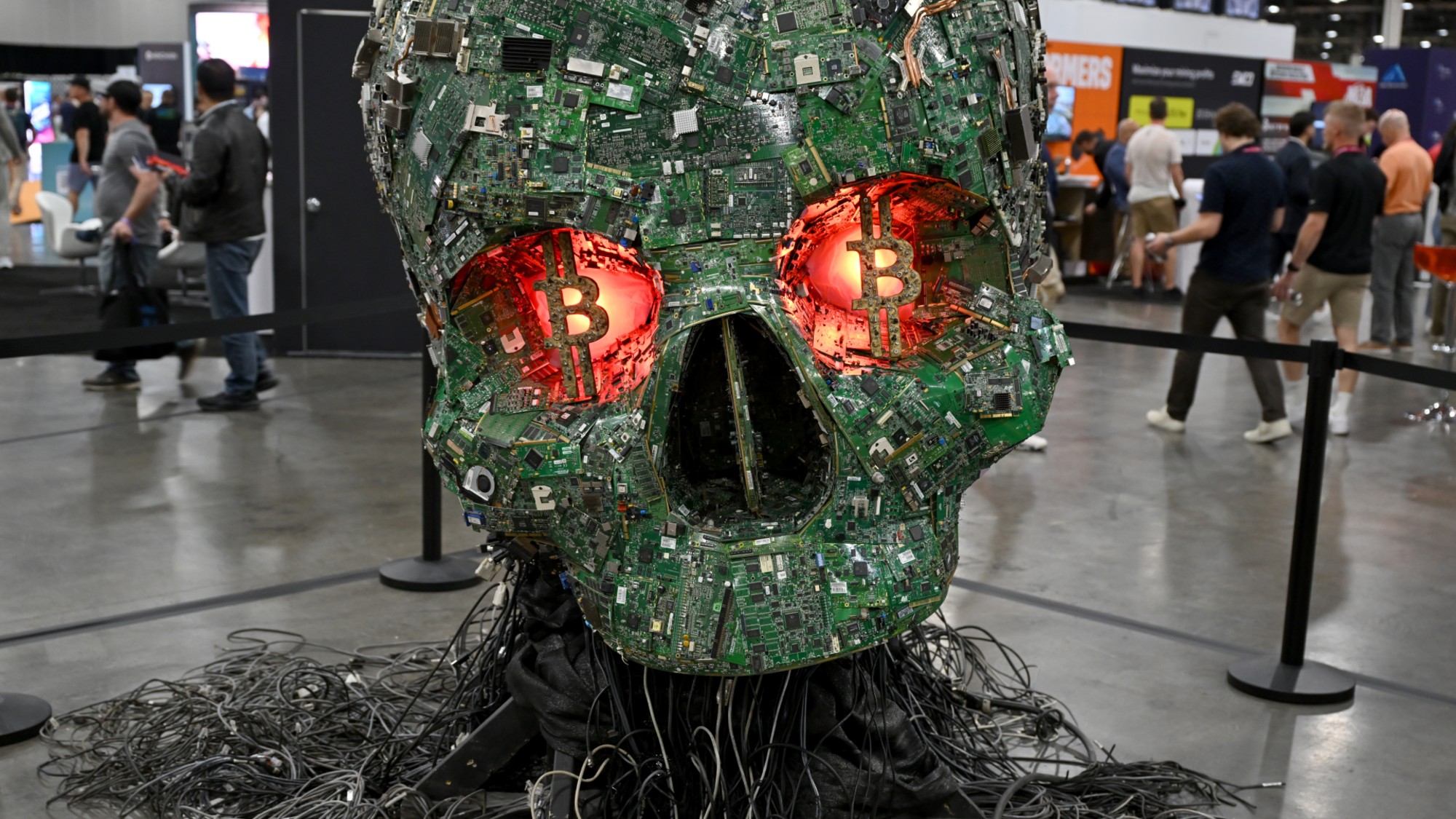Ethereum: what is it and how much is it worth?
Here’s everything you need to know about bitcoin’s main rival

A free daily email with the biggest news stories of the day – and the best features from TheWeek.com
You are now subscribed
Your newsletter sign-up was successful
Cryptocurrency investors have over a thousand digital coins to choose from in today’s market but only a select few consistently find themselves at the top of the pile.
One of those virtual currencies is Ethereum, which has been playing second fiddle to bitcoin since joining the market in 2015.
The cryptocurrency was one of the standout digital tokens at the start of the year, says The Daily Telegraph, after it jumped from a value of around £340 per coin in December to over £1000 in mid-January.
The Week
Escape your echo chamber. Get the facts behind the news, plus analysis from multiple perspectives.

Sign up for The Week's Free Newsletters
From our morning news briefing to a weekly Good News Newsletter, get the best of The Week delivered directly to your inbox.
From our morning news briefing to a weekly Good News Newsletter, get the best of The Week delivered directly to your inbox.
Prices have since tumbled due to a number of policy changes, such as South Korea’s ban on anonymous cryptocurrency exchanges in February, but Ethereum is still the second most valuable virtual coin in existence.
Here are some key facts about bitcoin’s closest competitor:
What exactly is Ethereum?
Much like bitcoin and other digital currencies, Ethereum is a virtual coin that allows for anonymous transactions online.
A free daily email with the biggest news stories of the day – and the best features from TheWeek.com
The cryptocurrency was created by the Russian-born programmer Vitalik Buterin in 2013, when he was just 19 years old, says Wired, and was listed on public exchanges two years later. Buterin established Ethereum as an open-source alternative to bitcoin, meaning that third parties could use the technology for stocks, bonds or even “deeds to houses”.
The cryptocurrency is decentralised, says Digital Trends, meaning the digital tokes – commonly referred to as Ether – aren’t held or regulated by a single company or bank. Instead, Ethereum tokens can be purchased, stored and used for anonymous transactions by the individual.
So how does it work?
Ethereum is based on blockchain technology, an anonymous online list that logs all the cryptocurrency’s digital coins in existence and who owns them.
The ledger itself isn’t stored in one place, says BBC News. Instead it’s distributed across thousands of computers through the internet.
When you purchase an Ethereum token using a cryptocurrency exchange, such as Coinbase, the online ledger is updated. You are then given an encrypted digital key to access your block on the list, the BBC says. The ledger records every transaction ever made and cannot be altered or tampered with.
This process is similar to most cryptocurrencies. It was pioneered in 2009 by bitcoin’s mysterious founder, who uses the pseudonym Satoshi Nakamoto.
What sets Ethereum apart from its rivals is its open-source architecture, which makes it simpler for third party companies to work with.
Bitcoin’s appeal, according to The Daily Telegraph, is that it allows users to store their money outside banks. Ethereum, on the other hand, can be used to store files on a cloud storage service or spawn smaller independent digital tokens known as initial coin offerings (ICOs).
Ethereum has a loyal fan base. These fans believe the cryptocurrency’s value lies in its ability to improve the efficiency of transactions, rather than in its ability to store money online, the paper says.
Which companies use it?
Cryptocurrencies have met with a mixed reception so far, due to their volatility as well as to scams associated with the technology, but the Ethereum network has been adopted by several corporations over the past 12 months.
According to Time, nine major companies, including JP Morgan Chase, Microsoft and Intel, now use the technology. These firms recently established the Enterprise Ethereum Alliance in a bid to get more firms to use the Ethereum technology.
A number of start-ups also use Ethereum in surprising ways, Business Insider reports. Rather than focusing on making millions for their investors, their goals are more modest.
Ixo Foundation, for example, uses the Ethereum network to keep track of volunteer workers, the news site says. Users can log how many hours they tutored a child or how many trees they planted on the network, which can then be accessed by people across the world through the blockchain.
How much is it worth?
The current value of a single Ether coin, as of 3pm on 16 April, sits at around $502 (£351), according to the ranking website CoinMarketCap. This figure will fluctuate throughout the day, so it will have likely changed by the time you read this.
Ethereum’s value per coin is down significantly compared to its all-time high at the beginning of the year. Figures from CoinMarketCap reveal the digital currency reached a peak of approximately $1,400 (£1,000) in January.
The figure then lost nearly 75% of its value between March and the first week of April, reaching a low of around $371 (£260) before rebounding to its current price.
Cryptocurrency experts told the Daily Express that Google and Facebook’s recent crackdown on adverts for digital coins and exchanges could be attributed to Ethereum’s slump. Many of the virtual currency’s rivals, including bitcoin, Ripple and Litecoin, were also impacted by the news.
However, the Daily Express says Ethereum’s price has recovered thanks to the launch of a new cryptocurrency called Golem GNT last week, which led to an increasing in trading activity across the market.
-
 Is Andrew’s arrest the end for the monarchy?
Is Andrew’s arrest the end for the monarchy?Today's Big Question The King has distanced the Royal Family from his disgraced brother but a ‘fit of revolutionary disgust’ could still wipe them out
-
 Quiz of The Week: 14 – 20 February
Quiz of The Week: 14 – 20 FebruaryQuiz Have you been paying attention to The Week’s news?
-
 The Week Unwrapped: Do the Freemasons have too much sway in the police force?
The Week Unwrapped: Do the Freemasons have too much sway in the police force?Podcast Plus, what does the growing popularity of prediction markets mean for the future? And why are UK film and TV workers struggling?
-
 Why Trump pardoned crypto criminal Changpeng Zhao
Why Trump pardoned crypto criminal Changpeng ZhaoIn the Spotlight Binance founder’s tactical pardon shows recklessness is rewarded by the Trump White House
-
 Bitcoin braces for a quantum computing onslaught
Bitcoin braces for a quantum computing onslaughtIN THE SPOTLIGHT The cryptocurrency community is starting to worry over a new generation of super-powered computers that could turn the digital monetary world on its head.
-
 The noise of Bitcoin mining is driving Americans crazy
The noise of Bitcoin mining is driving Americans crazyUnder the Radar Constant hum of fans that cool data-centre computers is turning residents against Trump's pro-cryptocurrency agenda
-
 What Trump's win could mean for Big Tech
What Trump's win could mean for Big TechTalking Points The tech industry is bracing itself for Trump's second administration
-
 Network states: the tech broligarchy who want to create new countries
Network states: the tech broligarchy who want to create new countriesUnder The Radar Communities would form online around a shared set of 'values' and acquire physical territory, becoming nations with their own laws
-
 Paraguay's dangerous dalliance with cryptocurrency
Paraguay's dangerous dalliance with cryptocurrencyUnder The Radar Overheating Paraguayans are pushing back over power outages caused by illegal miners
-
 2023: the year of crypto instability
2023: the year of crypto instabilityThe Explainer Crypto reached peaks — and valleys — throughout 2023
-
 Sam Bankman-Fried found guilty: where does crypto go from here?
Sam Bankman-Fried found guilty: where does crypto go from here?Today's Big Question Conviction of the 'tousle-haired mogul' confirms sector's 'Wild West' and 'rogue' image, say experts